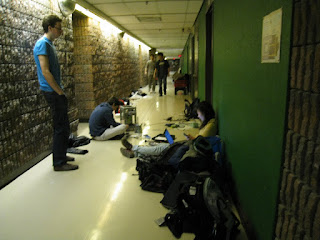I jotted down many quotes in this time interval, because every. single. social. interaction. now feels deeply meaningful and like a carefully conserved resource. Plus they're all happening over video chat, so my notebook is always at-hand. Here is a selection (some quotes were expurgated for being too personal, or too crass when out-of-context); my apologies that my name-randomizing algorithm does only one letter/person, and so has a lot of collisions in the namespace.
M: "I'm super-enjoying not owning things."
Z: "I'm sure there's middle-management goats."
M: "I have the, like, the limping-along ovary."
Z: "Moving online is just an endless stream of apps that stink."
B: "We're DnD role-playing millennial fantasy: we all have stable jobs and healthy relationships with good communication."
B: "Climb the clocktower?"
K: "That's the kind of thing I should wait until AFTER I have tenure to do."
J: "Filibuster #4 has been my favorite"
I: "I am confident our future department chair can be nimble and flexible in the upcoming Battle Royale."
Z: "A lot of this makes no sense."
K: "We learned: everything is bad and nobody is happy."
K: "I can't wait to read your bestselling business novel about How Not to be a Craven Bootlicker."
Q: "Basically everything the administration does is a giant fuck-you to student culture."
Y: "... not disappointed with the decision, more disappointed with reality."
Y: "You can't compress coding time."
I: "What happens in a COVID year stays in a COVID year."
Z: "I have to look up what is legal or not legal in Pennsylvania."
Q: "Most things are legal if you don't get caught."
N: "[name redacted] stepped on my glasses. I'm trying to fix them."
N': "With a pine cone?"
Z: "All KINDS of things can happen!"
Q: "Meteors?"
Z: "Hurricane season's just getting started."
M: "Oooh, all this talk of working out, I'm sweating."
Z (offhandedly): "high-functioning democracy here"
M: "In theory, anything can be ruined with any move."
N: "If you go by feel you'll know what to do."
Z: "You might be setting your expectations of [name redacted] a bit high."
N: "Winter is coming." (w.r.t. self-haircuts)
Z: "Koi are domesticated carp. They'll eat trash. They're aquatic goats."
Z: "We need to think about how to teach our classes. We can't spend all our time doing other people's jobs."
M: "I don't like shoreline poop."
D: "To Americans right now, euros are fantasy currency."
N: "When I began my homeowning episode..."
Z: "I got the email that Swarthmore ran out of electricity." (i.e., power outage)
Z': "I like that phrasing."
Z: "Postmodern algebra... it's like Bauhaus meets rings and groups."
C: "[name redacted]'s like, this is lovely, I love being so confused."
C: "I tried to write 'an exercise left to the reader' in my homework."
Z: "In physics you can totally just insert a random minus sign to make it work."
C: "I ended up playing with my tmix configuration for a day and a half."
Z: "Quarantine life! ... why do something in 4 keystrokes when you could do it in 3?"
N: "He had it apart several times this week, doing exploratory surgery." (re: the dryer)
N: "You're living the life! Tomorrow you'll be 90 and you found a secret medication that lets you eat salami!"
Z: "I snoozed the email and hoped it would go away in a week. It has not gone away."
K: "We had a really similar form that was much shorter but still as stupid as this one."
N: "The serger so ups the quality of your sewing."
F: "It doesn't if you don't use it."
F: "Bike doula."
K: "I think you mean 'sherpa'."
K: "You're very badly-behaved children." (re: some adults)
F (parent): "They could be worse."
Z: "For upper-level courses I have no problem offering both, and if one of them just dies a natural death, that's fine."
N: "The 38th is conventionally the bandsaw anniversary. ... the 39th is the home security system for birds."
I: "We don't get updates because the policy is changing, we get updates because the slogan is changing."
Z: "Thank god there's a deadly virus around so we don't have to focus on Brexit anymore."
I: "That crisis only affects teenagers, so we don't care."
Z (product pitch): "Each week you get a box of foods that people won't purchase even in an emergency."
Z: "Thank god for climate change and the death of the amphibian."
Z: "Could the Ottomans competently administer a test to teens? I say, welcome to our new Ottoman overlords."
Z: "Someone pored over the outline of the eagle thing. Gotta get paid somehow."
Z: "Everybody universally hates the robot, which is the appropriate response."
Q: "Static! I only hear it when you're talking."
Z: "That's just my midwestern accent."
Z: "I was uncomfortable because I'm an idealist."
N: "It's a circular saw at the end of a string trimmer."
M: "Wait, like... Mad Max?"
[D joins the video chat]
All others: "Good morning! Welcome to Vasectomy Talk."
Z: "I have walked less than 20 steps today & all of them were on this camera."
D: "Whoever is playing the video of my voice, can you mute it?"
Firstborn: "Everyone knows I'm the one who inherits the titles and lands."
Secondborn: "And I have the right to marry a divorcée."
Thirdborn: "And I'm supposed to go into the clergy?"
[laughter]
Parent: "I love my children! That was the best possible answer! Perfect!
Q: "They'll only hear your yowls of pain when you're shocked for typing on the keyboard wrong."
This post's theme word is lithophone (n), "a musical instrument which is sounded by striking pieces of stone." It's easy to fall down a quarantine video rabbit-hole and watch many modern and ancient lithophones played.


